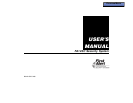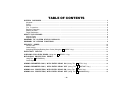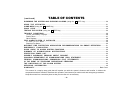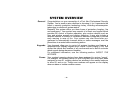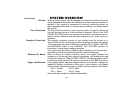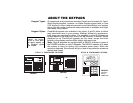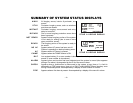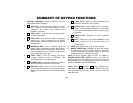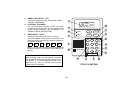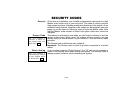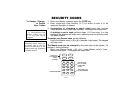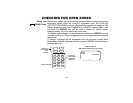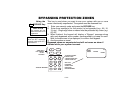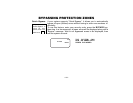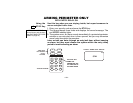
Ð8Ð
SUMMARY OF KEYPAD FUNCTIONS
1. DISPLAY WINDOW: Displays protection zone ID
and system status messages.
2. 1
OFF KEY : Disarms burglary portion of the sys-
tem, silences alarms and audible trouble
indicators, and clears visual display after
problem's correction.
3. 2
AWAY KEY : Arms the entire burglary system
,
perimeter and interior.
4. 3
STAY KEY : Arms perimeter portion of burglary
system only. Interior protection is not armed,
which allows movement within premises without
causing alarm.
5. 4
MAXIMUM KEY : Arms in manner similar to
AWAY mode, but without the entry delay feature,
thus providing maximum protection. An alarm will
occur immediately upon opening any protection
point, including the main door.
6. 5
TEST KEY : Tests the system and alarm
sounder if disarmed. Refer to
TESTING THE
SYSTEM
section for test procedures.
7. 6
BYPASS KEY : Removes individual protection
zones from being monitored by the system.
8. 7
INSTANT KEY : Arms in manner similar to
STAY mode, but without the entry delay feature.
Entering via the main door will cause an instant
alarm.
9. 8
CODE KEY : Used to assign additional user
codes for other users of the system.
10. 9
CHIME KEY : Turns CHIME mode on and off.
When on, the opening of windows or doors while
the system is disarmed will sound 3 beeps at the
keypad(s).
11. ✴
READY KEY: Displays all open protection
zones.
12. #
KEY: "Quick Arm" key permits ARMING of the
system without use of a security code (if so
programmed)
.
13. KEYS 0Ð9: Used to enter your security code(s).
14. READY INDICATOR: (GREEN) Lit when the system
is ready to be armed (no faults present). While the
system is disarmed, this indicator will go on and off as
protection zones are closed and opened.
Note:
On some keypads (Style A) there is, instead, a
POWER INDICATOR (GREEN) which is lit when AC
power is present. If the indicator is off, the system may still
be operating, but on its backup battery power. See
Power
Failure
in
TROUBLE CONDITIONS
section.
†
Note: Keys 1 through 9 each perform their
associated companion functions (OFF, AWAY, STAY, etc.)
when preceded by an entry of the security code (as
described later).



